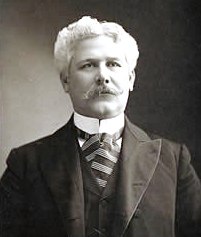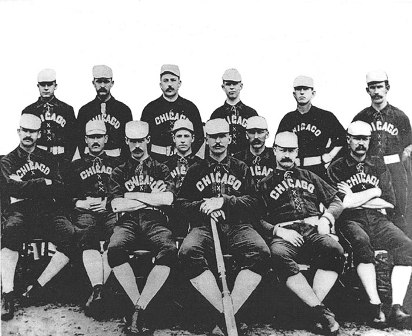For as long as there has been a game, there have been plans intended to “save” it.
Tim Murnane considered himself a diet expert, and a baseball expert.

Tim Murnane
The baseball player and pioneer turned sportswriter proposed his plan to save baseball in the fall of 1895 in the pages of The Boston Globe.
Murnane said:
“Many lovers of baseball claim that the sport is degenerating, owing to leading clubs engaging players from all parts of the country.
“How can a man, they ask, born and brought up in New York city, join the Boston club and be as anxious to defeat the Giants as would a man hailing from the East?”
Murnane used Cincinnati Reds catcher Morgan Murphy “the great Boston favorite” as an example:
“Year after year he is forced to go out to Cincinnati from his home in Rhode Island when the Boston public would be delighted to see him in a Boston uniform.”
In addition to Murphy, said Murnane, there was Boston infielder and Chicago native Herman Long:
“Now wouldn’t he look more in place in a Chicago uniform.”
In order to give the game “more local coloring” Murnane proposed:
“The National League to be composed of eight clubs, representing Boston, New York, Philadelphia, and Baltimore in the east, Pittsburgh, Chicago Cleveland and Cincinnati in the west.”
Murnane then set up a series of territories, for example, all Chicago players would have to come from Illinois, Iowa, or Minnesota—New York could only sign players From Connecticut, New York, and New Jersey. Each team could only sign players from their territory.
Players from all western states except California would be eligible to play for any of the “western” teams, and California players would be able to sign with any club.
Next, Murnane proposed reestablishing the American Association as a feeder league with franchises in in Providence, Brooklyn, Washington D.C., Buffalo, Louisville, St. Louis, Indianapolis, and Columbus. These teams could sign players from anywhere and the entire rosters would be eligible to be drafted by the National League clubs at the close of each season.
Part of Murnane’s plan also addressed one of his personal crusades:
”Abolish Sunday ball playing by league clubs and make it optional with the clubs of the association.”
The Globe published a list of every current major leaguer, and showed which team they would be with under the plan.
Murnane was convinced his proposal:
“Would give baseball a grand boom from Maine to California, as it would revive the interest among the amateur players and give each section of the country something special to work for.”
The Globe’s larger rival, The Boston Post, couldn’t wait to tell readers how horrible Murnane’s plan was.
Never mentioning the rival paper’s writer by name, The Post said:
“The recent scheme of how to enliven baseball in the East and give the game more local tinge has given the gossiper a chance to assert himself.”
The “scheme” said The Post had already been “exploded by many of the enthusiasts, ball players, and ex-ball players in this vicinity.”
One local businessman and “greatest enthusiasts of the game in this city,” noted that the champion Baltimore Orioles did not have a single player from their “territory,” and “There would be a great deal of kicking,” from Orioles fans.
Beaneaters president Arthur Soden told the paper he was against the plan despite the fact that:
“We might, of course, have a winning team, as we have such a lot of men to pick from, but it looks to me that the other teams in consequence would be handicapped for good men.”
An Eastern League umpire named John Bannon, noted that the geographical restrictions would be a boon for owners as players would “be forced to sign for any amount the magnates offered them, “ and pronounced the plan “ridiculous.”
James “Doc” Casey, a Massachusetts native then with the Toronto Canucks in the Eastern League, who would later play 10 major league seasons—none in Boston—was also against the plan:
“If directors were forced to make up their teams from a certain territory, then the extremes would be reached. One club would have all of the cracks and another would be forced to go through the season with a crowd of men who be incompetent.”
With that, Murnane’s plan to “save” baseball died a quiet death.




It’s somewhat reassuring to know that people have been trying to “save” baseball forever and the proposals have always been terrible.